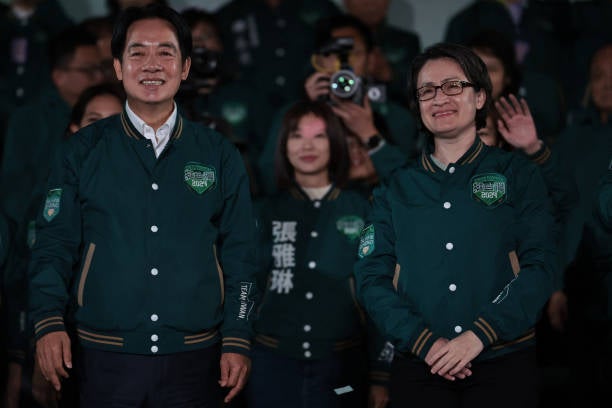China says Lai’s win in Taiwan will not change landscape of cross-strait relations
Several western nations, including Britain and Canada, congratulate Lai on his win
As Taiwan’s ruling Democratic Progressive Party (DPP) pulled off a historic win with voters shrugging off China’s concern about presidential candidate Lai Chinge-te, Beijing attempted to downplay his influence.
Taiwan’s current vice president, Mr Lai, issued a defiant message to China as he declared victory on Saturday evening.
“This is a night that belongs to Taiwan. We managed to keep Taiwan on the map of the world,” he said at a rally after the declaration of results. “The election has shown the world the commitment of the Taiwanese people to democracy, which I hope China can understand,” he added.
Mr Lai’s DPP has consistently rejected China’s territorial claims over Taiwan, while he has been denounced by Beijing.
The Chinese government responded to his win by calling Taiwan “China’s Taiwan” and adding that their commitment to “reunification” remained “as firm as rock”.
Following his win, China’s Taiwan Affairs Office issued a statement saying Mr Lai’s win would not change the basic landscape of cross-strait relations.
In a statement carried on China’s state Xinhua news agency, Chen Binhua, a spokesperson for the office, said the results showed the Democratic Progressive Party cannot represent mainstream public opinion on the island.

The electorates were mainly choosing between the governing DPP, which champions Taiwan‘s separate identity and rejects China’s territorial claims, and the opposition Nationalist Party, Kuomintang, which wants to expand trade ties with China.
The result showed that Mr Lai won more than 40 per cent of the vote, while the KMT candidate, Hou Yu-ih garnered 33.49 per cent, indicating support for DPP’s view on Taiwan’s claim for sovereignty, leaving Beijing visibility uncomfortable.
The Chinese embassy in Japan also reacted strongly after the country’s foreign minister Yoko Kamikawa issued a statement congratulating Taiwan’s new president-elect.
In a statement published on the Japanese foreign ministry’s website on Saturday, after the results of the Taiwan presidential election were announced, Ms Kamikawa wished Mr Lai on his win, calling it "an extremely crucial partner and an important friend."
In response, the Chinese embassy in Japan, without mentioning Mr Lai or acknowledging his victory, described Ms Kamikawa’s comments as "a serious interference in China’s internal affairs", according to a statement published on Sunday on the embassy’s official WeChat account.
"We express strong dissatisfaction and resolute opposition to this, and have lodged solemn representations with the Japanese side," the embassy said.
Japan, like most countries, does not have official diplomatic relations with Taiwan, a precondition for establishing diplomatic ties with China.
But Japan’s alliance with the United States, Taiwan‘s most important backer, and its proximity to the island, along with recent tensions in its ties with China, have prompted Tokyo to pursue closer ties with Taipei.

"The government of Japan will work toward further deepening cooperation and exchanges between Japan and Taiwan," Ms Kamikawa said in her statement.
The Chinese embassy said Japan should refrain from sending any "wrong signals" to "Taiwan independence" forces, a label Beijing uses to describe Mr Lai and his political party.
Mr Lai said he would maintain the status quo in relations across the Taiwan Strait, but that he was "determined to safeguard Taiwan from threats and intimidation from China".
South Korea hoped for peace and stability to be maintained across the Taiwan Strait, Yonhap news agency said on Sunday, citing a South Korean foreign ministry official in response to Mr Lai’s election.
"We hope to continue to enhance practical cooperation with Taiwan in various areas," the unidentified official was quoted as saying.
Meanwhile, several western nations, including Britain and Canada also congratulated Mr Lai on his win.
Issuing a statement, Ottawa said it looked forward to advancing people-to-people, science, trade & investment ties, while UK foreign secretary David Cameron expressed hope that Mr Lai will renew efforts to resolve differences with China peacefully.
"The elections today are testament to Taiwan’s vibrant democracy," he said. "I hope that the two sides of the Taiwan Strait will renew efforts to resolve differences peacefully through constructive dialogue, without the threat or use of force or coercion."
The US walked a diplomatic tight-rope with president Joe Biden saying “we do not support independence”, ahead of the polls opening. Washington had warned "it would be unacceptable" for "any" country to interfere in the election.
Russia maintained its stance saying it continues to view Taiwan as an integral part of China.
Additional reporting by agencies
Join our commenting forum
Join thought-provoking conversations, follow other Independent readers and see their replies
Comments
Bookmark popover
Removed from bookmarks